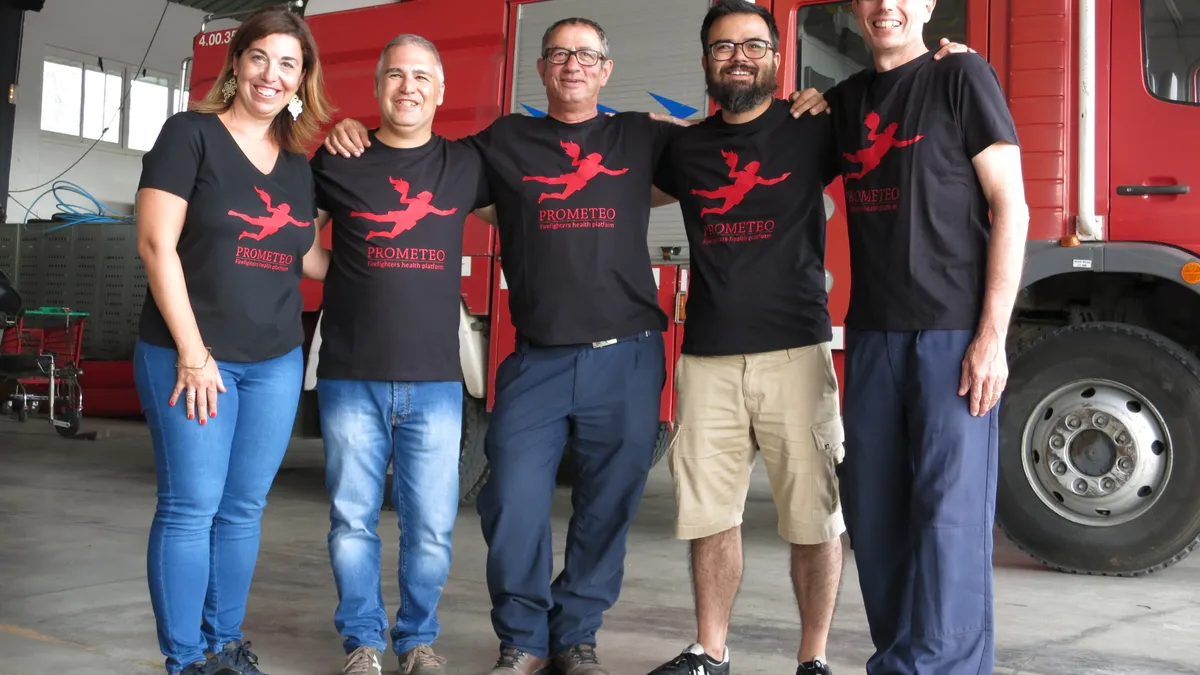UPDATED, Oct. 15, 2019: IBM announced Prometeo as the winner of its 2019 Call for Code contest. The project, developed by a team from Barcelona, is a hardware-software solution that uses artificial intelligence (AI) and the internet of things (IoT) to keep firefighters safe as they battle blazes.
When in use, a health device with multiple sensors is strapped to a firefighter’s arm and measures variables like temperature, humidity and smoke concentration. Information is collected and transmitted to the cloud, then sent to the IBM Watson-based machine learning model, which distills the information into a simple color-coded status for fire command centers to monitor the health of each deployed firefighter in real-time.
The Prometeo team is composed of veteran firefighter Joan Herrera, emergency medical nurse Vicenç Padró, and three developers and data scientists: Salomé Valero, Josep Ràfols, and Marco Rodriguez. The team took home a grand prize of $200,000.
Dive Brief:
- IBM has unveiled the top five global finalists of Call for Code, a contest in which teams develop technology to help communities respond to natural disasters.
- The finalists and their projects are:
- AsTeR, which prioritizes emergency calls by converting and analyzing speech to text in real time. It also offers a visual map to identify areas where people are affected.
- Healios, which connects case workers to those needing mental health care after a natural disaster through a mobile app.
- Prometeo, which connects sensors from firefighters' uniforms and collects data for health care professionals to study the effect of smoke and toxin inhalation.
- Rove, a text message chatbot for disaster victims to give information on their status, health and more. The bot generates a priority score to help first responders determine where the most help is needed.
- Sparrow Platform, an open-source artificial intelligence (AI) platform that serves as a one-stop shop for medical and psychological wellbeing during and after disasters.
- The winner will be announced Oct. 12 and receive a cash prize of $200,000, as well as technical support from IBM and the Linux Foundation to help their idea scale. The second- and third-placed finishers will receive $25,000, and fourth and fifth will receive $10,000, as well as technical support of their own.
Dive Insight:
As the impact of climate change is felt with more regularity, natural disasters like wildfires and hurricanes will hit more regularly too, and with greater severity. This challenge from IBM and a swath of partners looks to make use of a growing community in the technology sector willing to help communities cope with those natural disasters.
The contest is different as it looks not only to reward the best ideas with financial backing, but also with technical help to scale those ideas. Call for Code Chief Technology Officer Daniel Krook told Smart Cities Dive that judges also look for solutions that can help mitigate multiple types of natural disasters.
"What we are trying to do with the Code and Response program is take those Call for Code ideas, give them the resources they need to be deployed around the world so that they can make a real difference, and that they do have the materials and the framework and support to create sustainable business models around them," Krook said.
More than 180,000 independent and enterprise developers, data scientists, activists and students from 165 nations took part in this year's challenge, with their entries evaluated on several criteria. That includes how complete their idea is; whether it is an effective technological solution to a problem; whether it is creative or innovative; and if it is built with the user in mind.
"It has to be great software, but it also has to be something that's easily used," Krook said. The solution is then put through several rounds of testing to verify that it works and that it makes a difference.
It is not just technologists that are involved in the development of the applications. Krook said that teams that are "cross-functional" are often successful, meaning that one or more of their members has experience elsewhere.
It could be that they served as a firefighter and understand the needs of that sector, or they have worked in government agencies and so know where gaps in technology are. "It's not just always a technology-first approach to solving these problems," Krook said.
Krook said that while the winner gets the bulk of the help from volunteers and IBM's team of advisors, the company reaches out to all finalists with resources, especially if their product shows promise.
"In that way, we are fulfilling our promise, in that we don't just want to build applications that are thrown away, we do want to provide a framework for them to live beyond the competition even if they don't win it," he said.












